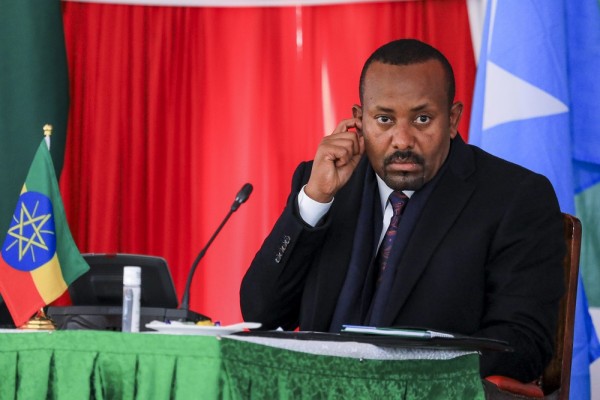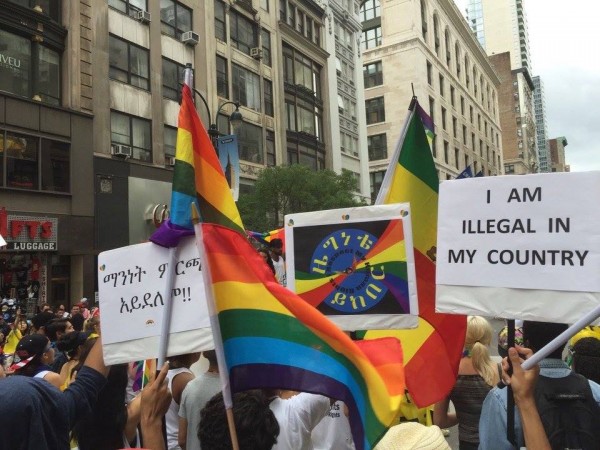In October, Ethiopia’s 43-year-old reformist prime minister, Abiy Ahmed, made international headlines by becoming the first African statesman in over a decade to win the Nobel Peace Prize.
Along with his critical role in building long-term peace and international cooperation in the Horn of Africa, the Nobel Committee also recognized the young leader’s remarkable success in “discontinuing media censorship”.
Such high praise is well deserved. Since coming to power in April 2018, Abiy has overseen one of the biggest transformations in media freedom anywhere in the world in recent years.
In 2017, Ethiopia ranked among one of the most censored countries in the world and one of the worst jailers of journalists in sub-Saharan Africa. The ruling coalition governed with an iron fist, cracked down on free speech and regularly persecuted critical journalists and bloggers. including International Press Institute (IPI) World Press Freedom Hero Eskinder Nega.
Fast-forward to 2019, and this picture looks very different. After assuming the premiership, Abiy loosened controls on the media, unblocked 260 critical websites and TV channels, and released dozens of journalists from prison. By the end of 2018, not a single journalist remained behind bars.
This remarkable transformation saw the East African state skyrocket in global press freedom assessments and become a model for reform on the continent. But while the change in Ethiopia is undoubtedly substantial, the reality of the new media climate in Ethiopia is far more complex than international headlines and the spotlight of the Nobel Prize let on.
One-and-a-half years after the start of the reforms, Ethiopian journalists are facing a new set of challenges and growing pains, including ethnic division, a lack of professionalism, self-censorship, and a restrictive legal environment.
While the country is still widely recognized as being on the right course, the honeymoon period is long gone and cracks are beginning to appear in Abiy’s reform programme, threatening to undo progress made so far.
Stalled reforms
After assuming the premiership in 2018, Ahmed moved quickly to shake up the media environment. In the first few months, political prisoners and journalists were released and charges were dropped against diaspora outlets. Opposition members were appointed to the boards of the Ethiopian Broadcasting Corporation, and foreign-based TV broadcasters were welcomed back from exile.
In this new environment, media freedom and diversity began to flourish. Twenty-three publications and six privately owned satellite channels were given new licenses. Journalists returned to the country to take up new posts, bringing with them critical coverage. Newspapers banned under the previous regime began to line the newsstands in Addis Ababa.
However, while action on opening the airwaves was quick, progress on reforming the previous government’s repressive legal apparatus has been far slower. Eighteen months on, little has changed. Still in place are the Freedom of Mass Media and Information and the Computer Crime Proclamation, both of which include provisions on criminal defamation and allow the authorities to issue crippling fines. Despite a commission set up to amend a controversial 2009 anti-terrorism law, a key weapon against the press wielded by previous regimes, no changes have materialized. And although Abiy publicly stated that the application of the law should be put on hold, it has been used in recent months to jail reporters.
“After a promising start, the picture in Ethiopia now is far more complicated”, Yared Hailemariam, the executive director of the Swiss-based Association for Human Rights in Ethiopia, told IPI. “A lot of progress was made as the media space liberalized. But in recent months, the government has begun to show signs it is reverting to old ways. Journalists have been arrested and the climate isn’t quite as open.”
As elections loom next year, many journalists are anxious to see their new freedoms guaranteed by law, rather than by the mere goodwill of the prime minister. “The government is not on the right trajectory because protection of media freedom has not been institutionalized yet”, Elias Kifle, CEO of Mereja TV, an outlet based in Addis Ababa, said. “The government needs to replace the current flawed constitution with one that prohibits future administrations from passing any law that stifles freedom of the press.”
Others believe Abiy’s reform programme is running out of steam. “In my opinion the government is losing momentum”, Nigussu Solomon, cofounder of Nubia Media and Communications, an Addis Ababa-based media organization, told IPI. “For the past year almost everyone was behind the change waggon. But as they lose the popular support, they are slowly going back to where they started.”
Old habits die hard
Events in recent months have added greater fuel to criticism that the government is rolling back progress by repeating the authoritarian methods of the past. Following high-profile political assassinations in July described by the government as part of a coup attempt, the climate for press freedom worsened after the government arrested five journalists from the Voice of Youth for Freedom on unsubstantiated terrorism charges. Other reporters have been attacked and arbitrarily detained by police.
In another regressive step, in July 2019 the Ministry of Defence announced plans to charge journalists and media houses that published information it considered libellous about the Ethiopia National Defence Forces with criminal defamation. Meanwhile, intermittent internet blackouts, common under previous governments, have further hindered the ability of journalists to carry out their work properly.
“Another big issue for journalists is a basic lack of information”, Elias Meseret Taye, the Ethiopia correspondent for the Associated Press, told IPI. “After it came to power the administration dismantled the governmental press and communication office. This severed the link between reporters and ministers. Press conferences are also rare.”
Despite the initial enthusiasm, recent events have raised concerns that reforms are stalling, he added. “You hear very positive things coming from the prime minister. But on the ground, the situation is much different. While a lot of progress has been made, the more difficult legislative and political changes have not yet come and people are getting impatient.”
Fanning the flames
While the prime minister’s reforms are widely seen as positive, they have also brought with them more unexpected consequences. The removal of restrictions on freedom of expression as well as rapid democratization has allowed Ethiopians to voice their views and demands as never before, a situation that has also fuelled ethnic tensions in Africa’s second most populous nation.
In October, over 80 people were killed as protests in the ethnic Oromia region morphed into deadly violence. At the centre of the dispute was Jawar Mohammed, head of the Oromo Media Network (OMN), an outlet previously exiled in the United States. Under the previous regime, journalists at OMN – like those at other Ethiopian media outlets working in the shadow of an autocratic regime – also saw themselves as activists. But having returned to the country, many are struggling to unblur the lines between the two.
“The tyranny of the past administration gave birth to opposition media”, Solomon explained. “However, each has their agenda. That’s why when the new government allowed them to come back to Ethiopia, they created political and ethnic division amongst the people.”
In the past, these long-buried ethnic grievances were repressed by the government. With little independent media in which to air the division, the issue was kept under control.
“But as the media space opened-up, journalists have been given more freedom to write about sensitive topics and criticize the government”, Hailemariam explained. “While many have used these new freedoms responsibly, some media in Ethiopia are spreading hate and inciting violence.”
The rise of open ethnic division has also compromised the safety of journalists. Crews reporting on sensitive ethnic issues have been attacked by civilian mobs and reporters are facing increased abuse and harassment online. Many media networks are now fearful of reporting outside their own region, Hailemariam told IPI.
In response, the Abiy government began drafting legislation that will prosecute those found guilty of spreading “fake news” and hate speech online. Last month, the Council of Ministers approved the draft bill. But as with any law on hate speech – not to mention “fake news” – the Ethiopian bill has prompted concern that it will be used to suppress freedom of expression and media freedom.
“In my opinion, some kind of hate speech law is required, as the spread of false information on social media has to be tackled”, Hailemariam said. “However, it must not come at the expense of media freedom. Strong institutions are needed to make sure the law is applied properly, and not used to target critics, as was done in the past.”
Professionalism problems
The dramatic opening of space in Ethiopia for press freedom and freedom of expression has also brought with it calls to ensure that the country’s journalists are equipped with the skills to effectively carry out their role as watchdogs.
According to Kifle, part of the problem of the country’s polarized media lies in the lack of training and standards among journalists. “I believe that is the number one challenge we in the media are facing today in Ethiopia is the lack of professionalism”, he told IPI.
Years of repression have left the profession underfunded and undertrained in the ethics of journalism, agreed Mekuria Mekasha, a professor at the Addis Ababa University’s School of Journalism and Communication. “State and private media outlets seriously lack professionalism and media ethics”, he told IPI.
To shake up this system, the government has reportedly announced plans to professionalize state media, though it is unclear what that would entail. In the case of independent media, journalists need to learn to act responsibly with their newfound freedoms, said Meseret. “Unfortunately there is a bloodline between activism and journalism in Ethiopia. A lot of so-called journalists are not professional. They insert their own views and give their own version of the facts.”
He is among those calling for the establishment of a press council in Ethiopia to act as an independent watchdog for the country’s new media climate. “Media in the country need to be far more ethical and accountable”, he said. “But regulation needs to come from the media themselves, not the government”.
Even with greater professionalism, however, structural problems within the media sector remain. Despite more media outlets being granted licenses, the number of publications in Ethiopia is still extremely low. A mere 30 print media serve a population of 105 million people, meaning wide circulation and mass consumption is limited.
Part of the problem is the challenging business climate, Mekasha explained. With a more diverse news climate and falling revenues from the rise of social media, many publications are struggling to survive. “Many media outlets may mushroom, but they will snuffed-out of the market”, he said.
To avoid closure, many are faced with changing their business models or instead, seeking outside financial support, she added. Under the current law, however, foreign nationals, including Ethiopian born foreign nationals, are barred from ownership of media in the country, further discouraging growth and investment.
Even then, much remains to be done to strengthen the industry. “A lot has to be done on capacity building, running media houses as a business, and improving representations of women and minority groups,” said Solomon. “Media houses need to work together to improve themselves to keep in check the government so that the people will be well informed when they make decisions on who will be leading them on the coming years.”
Silver linings
Despite its many challenges, Ethiopia is still a bright spot in a region hampered by slow change in terms of media freedom. Neighbouring Eritrea remains one of the least free countries on earth. Somalia is still one of the most dangerous places in the world to report from. Even nearby Tanzania, once seen as a democratic leader in East Africa, has overseen a crackdown on the press over the last three years.
In Addis Ababa, however, the signs of change are clear. This semester, Mekasha told IPI the city’s University’s School of Journalism and Communication has seen a massive increase in the number of students applying to study the subject. “This is because many media outlets are flourishing after Abiy took the power,” he said.
If this is anything to go by, Ethiopia has some hope yet. While the country remains one of Africa’s success stories, its transition media reform project is very fragile. Much remains to be done to consolidate the gains made so far and address the current challenges. In the coming years, both government, journalists and citizens have a part to play in ensuring this newfound media freedom does not wither before it has fully been given the chance to blossom.



